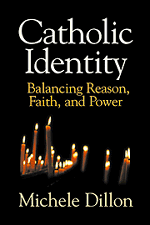Book contents
- Frontmatter
- Contents
- Acknowledgments
- 1 Pro-Change Catholics: Forging Community out of Diversity
- 2 Doctrinal Change in the Catholic Church
- 3 Official Church Teaching on Homosexuality, Women's Ordination, Abortion, and the Role of the Theologian
- 4 Pro-Change Groups in the Contemporary Church: Dignity, the Women's Ordination Conference, and Catholics for a Free Choice
- 5 Gay and Lesbian Catholics: “Owning the Identity Differently”
- 6 Using Doctrine to Critique Doctrine
- 7 Pluralism in Community
- 8 Reasoned Theology: Legitimating Emancipatory Possibilities
- 9 Catholic Options
- Appendix: Research Methodology
- References
- Index
1 - Pro-Change Catholics: Forging Community out of Diversity
Published online by Cambridge University Press: 04 August 2010
- Frontmatter
- Contents
- Acknowledgments
- 1 Pro-Change Catholics: Forging Community out of Diversity
- 2 Doctrinal Change in the Catholic Church
- 3 Official Church Teaching on Homosexuality, Women's Ordination, Abortion, and the Role of the Theologian
- 4 Pro-Change Groups in the Contemporary Church: Dignity, the Women's Ordination Conference, and Catholics for a Free Choice
- 5 Gay and Lesbian Catholics: “Owning the Identity Differently”
- 6 Using Doctrine to Critique Doctrine
- 7 Pluralism in Community
- 8 Reasoned Theology: Legitimating Emancipatory Possibilities
- 9 Catholic Options
- Appendix: Research Methodology
- References
- Index
Summary
Since its foundation, sociology has been concerned with the problem of the relation of the individual to the collectivity. Both Max Weber (1864–1920) and Emile Durkheim (1858–1917) were concerned with how social cohesiveness would be maintained in the face of changing institutional conditions, Weber was preoccupied with what he saw as the dehumanizing effects of an ever-expanding societal rationalization, whereas Durkheim focused on how collective solidarity might be maintained against social forces that appeared more likely to create anomie than moral order. We are still preoccupied with this long-standing sociological question. Today, the issue is whether the plurality of group identities seeking public legitimacy undermines social cohesiveness, unity, and order. There is a sense that the egalitarian advances achieved since the 1960s by women, racial minorities, and gay men and lesbian women, have been pivotal in unsettling the moral and institutional bases of social life.
While the question has been a constant one, it was raised with particular vigor in the 1960s, when diverse social movements arose and protested the idea of communality. These movements challenged the dominant culture and its inegalitarian institutional practices in the areas of family life, politics, law, and employment. The protest activity of women, gays and lesbians, and African Americans highlighted the existence of historical and sociocultural experiences that undermined the notion of a cultural universality.
- Type
- Chapter
- Information
- Catholic IdentityBalancing Reason, Faith, and Power, pp. 1 - 33Publisher: Cambridge University PressPrint publication year: 1999



